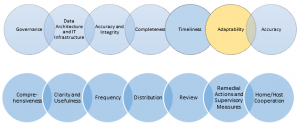 Principle 6:
Principle 6:
Adaptability – A bank should be able to generate aggregate risk data to meet a broad range of on-demand, ad hoc risk management reporting requests, including requests during stress/crisis situations, requests due to changing internal needs and requests to meet supervisory queries.
Principle 6 of the “Principles of Risk Data Aggregation and Reporting” by Basel (2013) addresses the need for adaptability of the risk data aggregation and reporting, that is, on-demand data availability and accessibility. This is the seventh post in our BCBS 239 Series on the use of high-performance analytics to manage risk data and increase the speed of information availability.
Broadly speaking, Principle 6 requires the aggregation system be able to quickly locate and retrieve the data required to meet an ad hoc reporting need. This system should provide flexible drill-down capabilities so the user can create views of the data to fit his or her reporting requirement.
Case study illuminates need for adaptability
The 2009 default of Greek sovereign debt provides an example of this need. The global market plunged into panic as the global financial crisis exacerbated years of structural deficit in the Greek government, downgrading both public and corporate debts issued by Greece in early 2010.
This market development urged regulators and banks’ senior management to understand their banks’ exposures to the Greek debts. To gain that understanding, banks conducted stress testing assuming various outcomes of the Greek debt crisis. Unfortunately, most banks were not prepared to report the exposures to the level of detail required. They had a very difficult time gathering all the data and quickly reporting exposures by country and counterparty. Some had to devote staffs numbering in the hundreds to accomplish this task.
Soon after the Greek debacle, Portugal, Italy, Ireland and Spain followed suit, and the same lengthy exercise had to be repeated for each of the countries.
Lessons learned
The Greek case reveals specific requirements from the principle of adaptability. A system must have data at the granular level so that it can support various aggregated view queries. It must also be able to quickly assemble information necessary to meet the request and be flexible enough to generate ad hoc reports that include new information and changes in compliance rules. Additionally, banks must to be able to apply stress testing scenarios to the retrieved information and report the results in a timely manner to make proper decisions.
The SAS in-memory grid based risk solution provides the answer to all these requirements. The solution can hold massive data usually distributed on a general purpose commercial grid. When an ad hoc query arrives, the relevant data can be quickly loaded into memory to allow the user to apply different hierarchical views on the data at the query time. In addition, it can enable on-demand stress testing on either predefined or ad hoc scenarios. It also supports various risk measures on any queried results. Users can enjoy all the flexibility and speed via a web user interface with possible mobile device delivery option.
The principle of adaptability requires a broad range of on-demand, ad hoc risk management reporting requests in a timely fashion. The SAS in-memory grid-based risk aggregation engine can precisely meet the challenge.
Learn more about how SAS can help you address BCBS 239 compliance.
